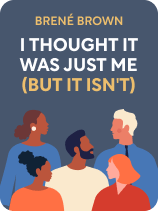

This article is an excerpt from the Shortform book guide to "I Thought It Was Just Me (but it isn't)" by Brené Brown. Shortform has the world's best summaries and analyses of books you should be reading.
Like this article? Sign up for a free trial here.
What is I Thought It Was Just Me (but it isn’t) by Brené Brown about? What are the main takeaways of the book?
Allowing shame to control our thoughts and feelings wreaks havoc on our health and happiness. In I Thought It Was Just Me, Brené Brown contends that to live a happy, empowered life you must combat shame by practicing empathy toward yourself and others.
Read below for a brief overview of I Thought It Was Just Me by Brené Brown.
I Thought It Was Just Me by Brené Brown
In I Thought It Was Just Me, Brené Brown discusses one of the most taboo topics of our culture: shame. She explains that shame is an intense feeling similar to embarrassment. It triggers feelings of fear, blame, and disconnection that can consume us and cause us to lash out at ourselves and others.
Brown says many people lack the skills necessary to handle and overcome shame, despite it being an all-encompassing and common sensation. Our inability to deal with shame wreaks havoc on our health, happiness, and relationships, and it perpetuates the cultural acceptance of shaming others. Brown contends that to live a happy, empowered life and help others to do the same, you must learn how to combat shame by practicing empathy toward yourself and others.
I Thought It Was Just Me (but it isn’t) is Brown’s first book, written in 2007 when she was a professor and researcher studying women’s experiences of shame. Today, Brown is an author of numerous best-sellers, a research professor, a lecturer, and a podcast host who studies courage, vulnerability, empathy, and shame. Some of her most popular books include The Gifts of Imperfection, Daring Greatly, Dare to Lead, and Atlas of the Heart. She’s the host of two podcasts, Unlocking Us and Dare to Lead, and is well-known for her 2010 TEDx talk on the power of vulnerability.
Shame Causes Fear, Blame, and Disconnection
Brown defines shame as a toxic, excruciating feeling that occurs when something or someone makes us feel like we’re defective and unworthy of love and connection. Shame most often happens when we believe we’re being labeled with an identity that we don’t want to be associated with.
For example, if you value being important, you might feel shame when another person outwits you because it makes you feel unimportant. Or, if you want to be seen as hardworking, you might experience shame when your boss suggests you spend more time on your work because you fear they think you’re a slacker. Ultimately, when our desired identities are threatened by identities we disdain, we experience shame. And according to Brown, when we allow shame to consume our mind, it produces three feelings that cause harm to our health, happiness, and relationships: 1) fear, 2) blame, and 3) disconnection.
Empathy Is The Solution To Shame
Based on her research, Brown argues that empathy is the solution to shame. Brown defines empathy as using our own experiences to understand others’ thoughts, feelings, and behaviors from their perspectives without judgment.
While we can’t entirely avoid experiences of shame, Brown says that strengthening our ability to empathize with both ourselves and others makes us less reactive to shame and combats the feelings of fear, blame, and disconnection that shame causes.
Brown says there are three components of empathy that combat the products of shame: courage, compassion, and connection.
How To Build Empathy and Combat Shame
Now that we’ve explored what shame and empathy are, let’s look at some specific practices for overcoming shame and building empathy. There are three main practices that Brown recommends you integrate into your daily life:
Practice #1: Acknowledge Your Shame and What Causes It
First, Brown notes, to start building empathy and combating shame, you must recognize when you’re experiencing it and what’s causing it. Recognizing your shame and its causes will allow you to separate from your negative thoughts and emotions before they can cause you to experience fear, react with blame, and become disconnected from yourself and others. Acknowledging your shame will enable you to practice courage, compassion, and connection.
Practice #2: Develop Critical Awareness of Shame
Brown explains that a second vital practice in developing empathy and combating shame is to understand shame with critical awareness. Brown defines critical awareness (as it relates to shame) as an understanding of why we deem certain identities as shameful, how shame around these identities impacts society, who’s most affected by the shame of identities, and who benefits the most from them.
To develop critical awareness about shame, think of an identity that makes you feel ashamed. Which components of this shameful identity contradict society’s or your inner circle’s expectations? Then, think of the ideal you feel like you’re supposed to be living up to instead, and consider its impact on society at large: Who suffers because of this ideal’s existence, and who profits from it?
Practice #3: Learn to Talk About Shame and Connect With Others
Brown’s final practice for developing empathy and combating shame is learning how to talk about shame and connect with others. We connect with others by sharing experiences and establishing mutual support. This is crucial to combating shame because it facilitates the empathy element of connection, which helps you put courage and compassion into action. Further, once you learn how to express your own shame and ask for support, you’ll be better equipped to listen to others and provide them with support.

———End of Preview———
Like what you just read? Read the rest of the world's best book summary and analysis of Brené Brown's "I Thought It Was Just Me (but it isn't)" at Shortform.
Here's what you'll find in our full I Thought It Was Just Me (but it isn't) summary:
- Brené Brown's guide on what shame is, why it happens, how it impacts our lives
- How to build empathy and combat shame
- Why it's important to talk about shame with others






